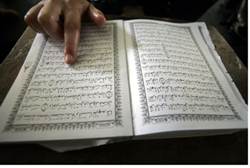Fragments of an early Koran found in a Birmingham library may rewrite Islamic history after carbon dating revealed they could be older than Mohammed the founder of Islam and its prophet.
Scientists at the University of Oxford had already revealed that the parchment was among the oldest known Koranic texts in the world, but now several historians say it could be so old that it pre-dates the Muslim prophet, thus contradicting traditional accounts of his life and radically altering “the edifice of Islamic tradition.”
The dating reveals the text to have been written between AD568 and 645, while the dates of Mohammed’s life are traditionally given as AD570 to 632. This means that at the very latest it was written before the first formal texts were supposed to have been collated, and at the earliest it was written before or shortly after Mohammed was born.
Some academics now say that the impact of the text could be comparable to finding a copy of the Gospels dating back to before the time of Christ.
Historian Tom Holland told the Sunday Times that evidence was now mounting that traditional accounts of Islam’s origins are wrong.
“It destabilises, to put it mildly, the idea that we can know anything with certainty about how the Koran emerged — and that in turn has implications for the historicity of Muhammad and the Companions [his followers],” he said.
Other very old Korans also seem to confirm that written texts were circulating before Mohammed’s death.
Needless to say, Muslim academics have disputed the claims. Mustafa Shah of London’s School of Oriental and African Studies (SOAS) said: “If anything, the manuscript has consolidated traditional accounts of the Koran’s origins.”
Meanwhile, Shady Hekmat Nasser from the University of Cambridge said: “We already know from our sources that the Koran was a closed text very early on in Islam, and these discoveries only attest to the accuracy of these sources.”
Dr Keith Small, a Koranic manuscript consultant at Oxford’s Bodleian Library, admits the carbon dating applies to the parchment, not the ink, while the calligraphy is characteristic of a later style.
Nevertheless, he believes the dates are probably correct and could raise serious questions for Islam.
“If the [carbon] dates apply to the parchment and the ink, and the dates across the entire range apply, then the Koran — or at least portions of it — pre-dates Muhammad, and moves back the years that an Arabic literary culture is in place well into the 500s.
“This gives more ground to what have been peripheral views of the Koran’s genesis, like that Muhammad and his early followers used a text that was already in existence and shaped it to fit their own political and theological agenda, rather than Muhammad receiving a revelation from heaven.
“This would radically alter the edifice of Islamic tradition and the history of the rise of Islam in late Near Eastern antiquity would have to be completely revised, somehow accounting for another book of scripture coming into existence 50 to 100 years before, and then also explaining how this was co-opted into what became the entity of Islam by around AD700.”









